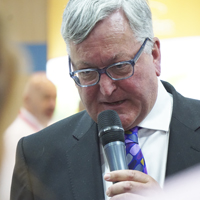Minister vows to deal with salmon detractors

FERGUS Ewing, Scotland’s rural economy minister, vowed to continue fighting for the future of the country’s salmon farming industry, which has come under increasing attack in recent months.
In a speech in Kirkwall to mark the tenth anniversary of Scottish Sea Farms’ operations in Orkney, Ewing praised the contribution the sector makes to the islands, saying: ‘Rural communities on the edge of Scotland would suffer without the salmon farming industry.’
Salmon farming supports jobs where there are no other alternatives, he said, and they were good, well paid jobs.
In fact, the average salary for Scottish Sea Farms (SSF) staff on Orkney is £37,215, higher than that for Scotland (£27,404) or Orkney generally (£26,26), and the company paid an annual local wages bill of £1.6 million in 2017/18.
The minister, a long time champion of the industry, said salmon farmers not only produced the ‘biggest and most important of our food exports’, but also provided the most nutritious food with the lowest carbon footprint – something none of his colleagues in the Green Party ever mentioned.
‘Yes, there are challenges and, yes, we’re overcoming these challenges, more than you would believe if you read or paid much credence to the main press.
‘My job is to get that message across – the real story that aquaculture in Scotland is the industry of the periphery; there is no other that is so successful, more important, more sustainable and more precious to my way of thinking than aquaculture and what you do.’
He said he and the Scottish government would offer ‘every support we can to deal with the detractors, to get the positives across, and together see even greater success in the future’.
That future is the subject of a parliamentary inquiry, by the Rural Economy and Connectivity committee, which is in the process of drawing up its report. This is expected to be published in the autumn, although no date has been set.
Ewing spent the day in Orkney, talking to farmers, and he held discussions with SSF board members, including Leif Inge Nordhammer, chairman of SSF and its Norwegian part owner, SalMar, the company which has pioneered open sea farming with its ground breaking Ocean Farm 1.
To celebrate a decade of successful salmon farming in Orkney, SSF commissioned an independent impact study, demonstrating the importance of the sector to rural populations.
Conducted by Imani Development, it found that SSF had grown its local workforce from nine to 44 full-time jobs, a figure that will increase to 50 when the company’s eighth farm goes live in 2019.
SSF managing director Jim Gallagher said: ‘To those living on mainland Scotland, 50 jobs might not seem like a huge deal.
‘However, for remote communities such as Eday, Rousay and Sanday that might only have a population of 150, each new job can make the difference between a local staying on the island or leaving, or new people being attracted on to the islands.’
The company also spent an average of £1.2 million annually across 74 local businesses, supporting as many as 250 indirect jobs across the supply chain.
In addition, the study showed that the salmon farmer has invested significantly in local skills and training, with 15 Orkney employees currently enrolled on Modern Apprenticeships and 508 training days undertaken by the team in 2017/18 – 118 of which were delivered via Orkney College UHI.
SSF’s Orkney regional production manager, Richard Darbyshire, paid tribute to the staff who, he said, had helped make the results in Orkney ‘world leading’ in the salmon farming sector.
‘We’re farmers first and foremost, and we know that growing healthy, premium quality fish relies on them being reared in healthy habitats.
‘Equally, we live in the same communities as we farm, therefore it’s incredibly important to us on a personal level that we look after our local environments.’
Picture: Fergus Ewing

